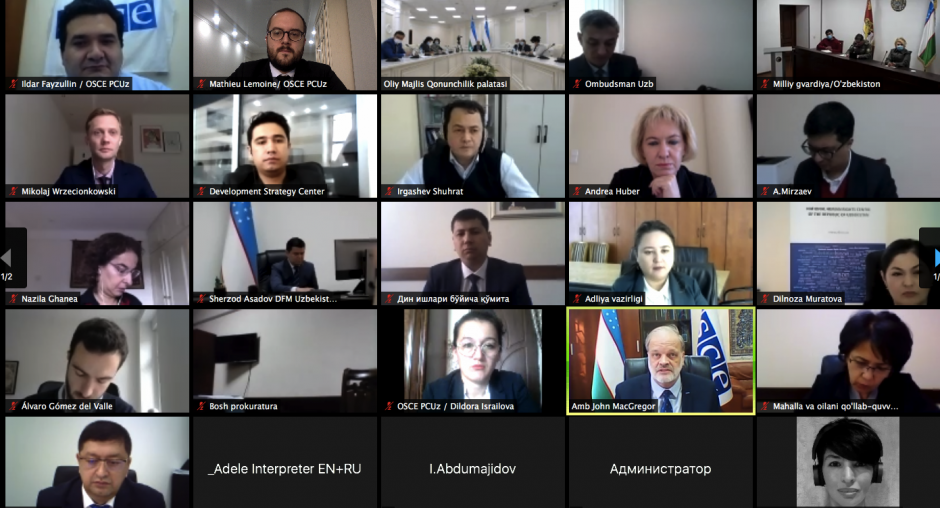OSCE co-hosts a series of events on freedom of religion or belief in co-operation with OSCE/ODIHR and the Government of Uzbekistan

A two-day series of online events on the nature, status and scope of the Right to Freedom of Religion or Belief for all (FoRB) as enshrined in international standards and the OSCE human dimension commitments concluded on 14 October 2020. The OSCE Project Co-ordinator in Uzbekistan organized the events targeted for Uzbekistan state officials. The series also included a briefing on the OSCE/ODIHR Freedom of Religion or Belief and on Security Policy Guidance.
The events were co-organized with the OSCE Office for Democratic Institution and Human Rights (OSCE/ODIHR), the Committee for Religious Affairs under the Cabinet of Ministers of Uzbekistan, and the National Human Rights Centre of the Republic of Uzbekistan.
Akmal Saidov, First Deputy Speaker of the Legislative Chamber of the Oliy Majlis (parliament) of Uzbekistan and Director of the National Human Rights Centre of Uzbekistan; Dilshod Eshnaev, Deputy Chairperson at the Committee for Religious Affairs under the Cabinet of Ministers of Uzbekistan; John MacGregor, OSCE Project Co-ordinator in Uzbekistan and Andrea Huber, Head of the Human Rights Department, OSCE/ODIHR opened the events.
International and national experts discussed relevant international standards concerning the right to FoRB and key parameters as enshrined in international standards and OSCE commitments and permissible limitations. They also introduced the Uzbek version of the OSCE/ODIHR Freedom of Religion or Belief and Security Policy Guidance and discussed four main themes addressed in the document.
"As the authorities of Uzbekistan continue to undertake important reforms in the area of freedom of religion or belief, it is vital that they formulate policies, enact laws, and operationalize measures which advance this fundamental human right for the benefit of all, while ensuring that genuine security needs are met", underlined Mikolaj Wrzecionkowski, Acting Senior Adviser on FoRB at the OSCE/ODIHR.
“The members of Uzbekistan’s Oliy Majlis (Parliament) and other State officials, by their intensive participation in the last two days’ events, have shown a keen interest in their role as lawmakers in the matter of protecting the Human Rights of Uzbekistan’s people,” stated John MacGregor, the OSCE Project Co-ordinator in Uzbekistan. “The OSCE ‘Family’ of the Project Co-ordinator in Uzbekistan and ODIHR have been pleased to co-operate with Uzbekistan’s National Human Rights Centre and the Oliy Majlis to create the opportunity for State officials and lawmakers to engage in dialogue with experts on the subject of Freedom of Religion or Belief, including related International Legal Obligations and OSCE commitments.”
The office of the OSCE Project Co-ordinator in Uzbekistan is particularly active in the freedom of religion or belief in the framework of Human Dimension commitments. In September, PCUz supported a series of videoconference meetings with the Legislative Chamber of the Oliy Mazhlis, the Committee for Religious Affairs, the Ministry of Justice, representatives of religious or belief communities, non-governmental organizations and the international community to prepare the Joint Legal Opinion by OSCE/ODIHR and the Venice Commission on the draft Law “On Freedom of Conscience and Religious Organizations” of Uzbekistan. As a result, on 12 October 2020, a joint Opinion was officially published, and will be translated into Russian and Uzbek languages soon.